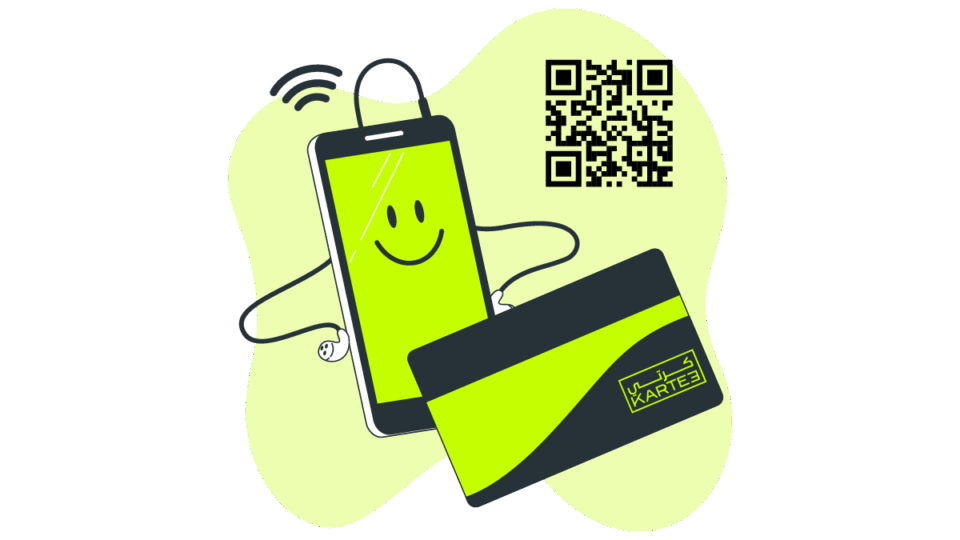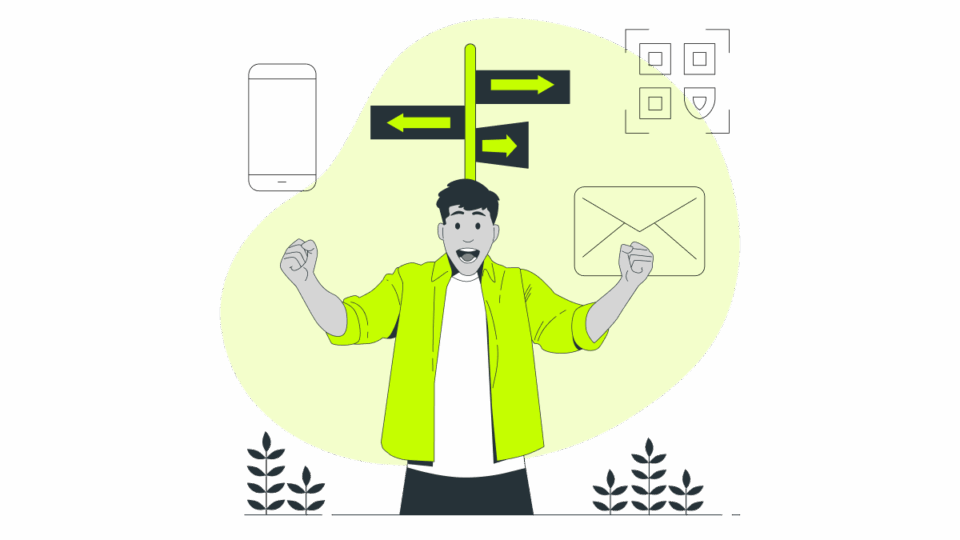
Going Green with NFC & Digital Business Cards: Sustainable Solutions for Modern Networking
June 18, 2025
7 Powerful Paper Business Cards Alternatives Every Professional Should Know
June 29, 2025
In a world that thrives on connectivity and real-time communication, clinging to outdated tools can hold you back. Yet, many professionals still carry stacks of paper business cards in their wallets, pockets, or briefcases, unaware that the world has moved on.
The truth is, the era of paper business cards is over. This isn't just a trend - it's a fundamental shift in how we connect, communicate, and conduct business. Why paper business cards are dead: time to go digital (business cards) is no longer a question - it’s the call to action for anyone serious about smart, modern networking.
Let’s explore how digital business cards, especially platforms like KARTEE, are replacing old habits with sleek, scalable, eco-conscious solutions for professionals and organizations worldwide.
The Decline of Traditional Paper Business Cards
A Brief History of Paper Business Cards
Paper business cards have a long legacy. They began as "visiting cards" in 17th-century France and England - small, elegant prints used by aristocrats to announce their arrival at social gatherings. Over time, they evolved into commercial calling cards used for advertising, and eventually, into business identity tools exchanged at meetings, conferences, and networking events.
Despite centuries of use, their fundamental structure has remained unchanged: a name, a title, contact details, and maybe a logo on a small rectangle of card stock. For a long time, they were seen as a symbol of professionalism. But in today’s digital-first world, tradition alone doesn’t cut it.
The Turning Point: Post-COVID Digital Shift
The global pandemic forced a rapid shift in how we do business. Handshakes were replaced with Zoom calls, and physical touchpoints, like brochures and paper business cards, fell out of favor. Professionals who once took pride in handing out embossed cards found themselves turning to QR codes, LinkedIn DMs, and NFC taps to share contact info.
This shift wasn’t temporary. It became the new normal. Digital habits formed during lockdowns have now become embedded in modern business culture.
Why Paper Cards No Longer Work in a Tech-First World
We live in a connected world. Everything from our schedules to our shopping lists is managed via apps and devices. So why are we still relying on something that requires us to manually input contact information into our phones or CRM systems?
Paper business cards are one-dimensional and outdated. They can’t be updated. They don’t track who received them. They offer no insights or interactivity. In a world where data drives decisions, paper cards provide exactly none.
Worse, they're forgettable. Within 24 hours of receiving one, most people either misplace it or forget about it entirely.
Limitations of Paper Business Cards in Modern Networking
Easy to Lose, Hard to Update
Have you ever left a conference with a stack of cards, only to misplace them before following up? Or discovered an old card, only to find the phone number is no longer active? Paper cards are static. Once printed, they’re frozen in time. Any change - phone number, job title, branding - means printing new ones and discarding the rest.
For growing teams, this becomes a logistical nightmare and an unnecessary expense.
Poor Engagement & No Analytics
A modern marketer wouldn’t launch a campaign without tracking engagement - why should networking be any different?
Paper cards offer no insights. You don’t know who’s looked at them, saved them, or thrown them away. With digital business cards, you get real-time analytics - views, clicks, shares, and even time spent on your profile.
This isn’t just a neat feature; it’s actionable data that allows you to refine your follow-up strategy and measure your ROI from networking.
Unsustainable and Wasteful
The environmental impact of traditional cards is staggering. An estimated 88% of paper business cards are thrown away within a week. Add in the trees, water, ink, and energy required for production, and the costs stack up - both financially and environmentally.
Today’s consumers and clients are increasingly eco-conscious. If your brand promotes sustainability but still uses paper business cards, you’re sending mixed messages.
What Is a Digital Business Card?
Key Features of Digital Business Cards
A digital business card is a modern, online solution for sharing your contact information, social profiles, portfolio links, and more - instantly and interactively. It’s accessible via a web link, QR code, Apple and Google wallets, email signature, or NFC-enabled card.
Unlike paper, digital cards are living documents - you can update your information in real time without reprinting or redistributing anything.
Core features include:
-
Custom branding (logos, colors, images)
-
Click-to-call, click-to-email, and calendar links
-
Embedded video and media
-
Real-time updates
-
Integrations with CRMs and analytics tools
How They Work in Real-Time Interactions
Imagine attending an event and meeting a potential client. Instead of fumbling for a paper card, you simply tap your NFC card to their phones or let them scan a QR code. Instantly, your entire profile is on their device - saved, interactive, and impossible to lose.
In virtual settings, you can embed your card into your email footer or Zoom background. In just one click, you’ve made a lasting connection.
Why Smart Companies Are Going Digital
Scalability for Large Teams
Managing paper cards for 10 employees is one thing - but for 100 or 1000? It’s a logistical nightmare. With a platform like KARTEE, businesses can create branded digital cards for entire teams, manage them centrally, and update them as roles or contact info changes.
It’s not just efficient - it’s strategic. It ensures consistency across all customer touchpoints, from sales pitches to support teams.
Real-Time Updates and Branding Control
Has someone on your team changed departments? Moved cities? Launched a new campaign? With digital cards, changes can be pushed live in seconds. There’s no need to wait for print runs or ship new batches.
And because the cards are digital, you can integrate campaigns, seasonal offers, or personalized links right into your team’s cards - making every share an extension of your brand.
Cost-Effective and Eco-Friendly
Traditional business cards are surprisingly expensive. A company with just 50 employees can easily spend over $1,000 a year on printing, reprints, and shipping - only for the cards to become outdated after a role change or rebranding.
With KARTEE’s digital cards, you pay a simple annual subscription and get unlimited updates, zero printing waste, and a sustainable solution that reflects your brand’s commitment to innovation and the environment.
Benefits of Virtual Business Cards Over Paper Cards
Instant Sharing Across Platforms
One of the most powerful advantages of virtual business cards is their versatility in how and where they can be shared. Whether you’re networking in person, on a video call, or over email, your card can be delivered in seconds. You can:
-
Embed it in your email signature.
-
Add a QR code to your LinkedIn profile.
- Add digital cards to Apple or Google Wallet.
- Tap your NFC card
-
Drop it into Slack, Microsoft Teams, or WhatsApp chats.
No more awkward digging for a physical card. It’s contactless, seamless, and - most importantly - memorable.
Seamless CRM & Contact Integration
Paper cards create friction. After an event, you have to manually input every new contact into your CRM, hoping you didn’t lose any along the way.
Digital cards integrate directly with platforms like Salesforce, HubSpot, and Google Contacts, allowing you to sync new leads in real time. With KARTEE, every scanned card or clicked link can automatically become a lead, contact, or tagged entry in your marketing system.
This smooth integration saves time, reduces human error, and accelerates follow-up - turning cold introductions into warm opportunities faster than ever.
Interactive Media & CTAs
A paper card can give someone your phone number and maybe a LinkedIn handle. But a digital card?
It can embed:
-
A YouTube video introducing your services.
-
A direct “Book a Call” link to your calendar.
-
Portfolio links with visual previews.
-
Embedded Google Maps for office locations.
-
Downloadable brochures or product sheets.
These interactive features allow your digital business card to become a micro landing page, not just a static contact tool. It's a touchpoint that invites action and engagement - making it exponentially more effective than a traditional card.
Eco-Friendly Business Card Alternative for a Greener Future
The Environmental Cost of Paper Cards
Let’s put it in perspective: over 5 million trees are cut down annually just to produce business cards. That results in hundreds of thousands of gallons of water, tons of waste, and enormous energy consumption. And yet, the majority of those cards - about 88% - are discarded within the first week.
Not only is this wasteful, but it’s also completely avoidable.
How Digital Cards Reduce Waste
Digital cards eliminate the need for paper, plastic coating, and transport altogether. There’s no printing, no packaging, and no emissions from delivery trucks. The impact is immediate and substantial.
By switching to platforms like KARTEE, companies can:
-
Reduce their carbon footprint.
-
Align with ESG (Environmental, Social, Governance) goals.
-
Appeal to eco-conscious consumers and clients.
In a marketplace where sustainability increasingly influences purchasing decisions, making the switch isn’t just smart - it’s brand-enhancing.
How KARTEE Makes Digital Networking Effortless
One Tap to Share
KARTEE’s NFC and QR-based tech makes sharing your digital card as easy as a tap. Whether you're networking at a conference or meeting a client over coffee, you can instantly share your contact details with zero friction.
No app download required for recipients. No awkward sign-ins. Just a fast, seamless connection.
Customization for Personal and Corporate Brands
Your business card should be a reflection of your identity. KARTEE allows users to customize cards with:
-
Company colors and fonts
-
Profile images or logos
-
Personalized welcome videos
-
Campaign-specific links
Whether you're a solo entrepreneur or a large corporation, your team’s cards can feel individually tailored while still staying consistent with your overarching brand.
Analytics to Track Networking ROI
Wouldn’t it be great to know who actually viewed your business card - and when?
With KARTEE, you get:
-
Real-time views and engagement metrics
-
Click-through tracking
-
Lead source identification
-
Custom UTM parameters for campaigns
This means you can identify your most effective networking moments, optimize your outreach, and even measure the true return on your in-person events or digital marketing campaigns.
Use Cases Across Industries
Freelancers & Creatives
Photographers, designers, consultants, and writers often rely on word-of-mouth referrals and personal brand building. A digital business card lets them show off their best work immediately, link to social proof, and make booking services effortless.
Corporate Sales & Marketing Teams
Sales reps need agility and consistency. With digital cards, companies can standardize messaging while allowing for local personalization. Plus, the integration with CRMs means every interaction is automatically logged, creating cleaner pipelines and faster deal velocity.
Conferences, Events & Trade Shows
In noisy event environments, paper cards get lost fast. With KARTEE, every attendee can scan your QR code and instantly receive your full digital profile. You can even track who engaged and follow up automatically post-event.
Some companies go the extra step and include their digital cards on badges, booth signage, or event apps - turning passive interest into active leads with a single scan.
How to Transition from Paper to Digital Business Cards
Step-by-Step Migration Plan
Switching to digital doesn’t have to be overwhelming. Here’s how most companies do it:
-
Audit your current usage - Identify how many people use paper cards and where they’re distributed.
-
Choose your platform - Go with a robust, scalable solution like KARTEE.
-
Create your templates - Design digital cards for different departments or roles.
-
Bulk import employee info - Set up accounts via spreadsheet import or API.
-
Launch internally - Educate employees through demos and training.
-
Promote the shift - Add QR codes to email signatures, websites, and presentations.
How to Encourage Adoption Internally
Change can meet resistance - especially when people are used to "the way things have always been." Make the transition easier by:
-
Running internal challenges or incentives for the most creative card.
-
Showing off analytics during meetings to demonstrate impact.
-
Encouraging early adopters to share their wins.
-
Replacing physical handouts entirely to reinforce the shift.
Most teams find that once they try a digital card, they never want to go back.
Myths About Digital Business Cards - Busted!
“They’re Not Professional”
Many people think digital cards look amateur - but that’s far from the truth. With custom branding, sleek design, and embedded functionality, they often look more polished and current than a traditional card.
“They’re Too Complicated”
The best platforms (like KARTEE) are plug-and-play. You don’t need to code, install, or even train heavily. If you can tap a phone or paste a link, you can use a digital business card.
“They Won’t Work Offline”
Most digital business cards stop working without internet access - a major limitation during conferences, travel, or in areas with poor connectivity.
KARTEE solves this with an exclusive offline mode your card can be shared instantly even without Wi-Fi or mobile data. No app required.
Top Features to Look for in a Digital Business Card Platform
Security & Privacy Controls
Make sure your chosen platform allows:
-
Password-protected cards
-
Data encryption
-
Visibility restrictions (public/private)
-
PDPL compliance
You’re sharing professional data - it needs to be secure.
Analytics & Integrations
Look for robust metrics like:
-
Unique views
-
Click rates on links
-
Lead generation sources
Bonus points if it integrates with your existing tools like Salesforce, Zoho, or Mailchimp.
Ease of Use and Shareability
The best digital cards work across:
-
Any device (iOS, Android, desktop)
-
Any browser
-
No app downloads required
-
QR code and NFC compatibility
The Future of Networking: Contactless, Digital, and Dynamic
NFC & QR Code Integration
The future is about frictionless contact. Expect business cards to evolve into smart tools that integrate:
-
One-tap NFC chips
-
Scannable QR codes embedded in merch
-
Smartwatch-compatible digital cards
All of these provide instant access to live, interactive profiles instead of static information.
Frequently Asked Questions
What is a digital business card?
A digital business card is an online tool for sharing your professional contact information, social links, media, and branding with just a tap or a click.
Are digital business cards safe?
Yes. Leading platforms like KARTEE use encrypted data transfer, customizable privacy settings, and secure hosting.
Can I still print my digital business card if needed?
Of course! Most platforms allow you to download printable versions or include QR codes for hybrid use.
Do virtual business cards work offline?
Yes. With KARTEE digital business cards, sharing can be done without an internet connection.
How do I share my digital business card quickly?
Via a QR code, NFC card tap, Apple or Google wallet, email signature, Zoom background, LinkedIn bio, or direct link - whichever works best in your context.
What’s the best eco-friendly business card alternative?
Digital business cards are hands-down the most sustainable option - no printing, no shipping, and zero waste.
Conclusion: Say Goodbye to Paper, Say Hello to Smarter Networking
Networking has evolved. The old ways of swapping flimsy cards that get lost or trashed are being replaced by smarter, sleeker, and more sustainable solutions.
With platforms like KARTEE, you gain more than a card - you gain a dynamic networking tool, real-time analytics, and a scalable solution that grows with you.
So ask yourself: in a world moving forward, why hold on to the past?
Make the switch. Go digital. Be remembered.
Unlock Your Business Potential with KARTEE
Get in touch today to transform your networking with cutting-edge digital business cards.


